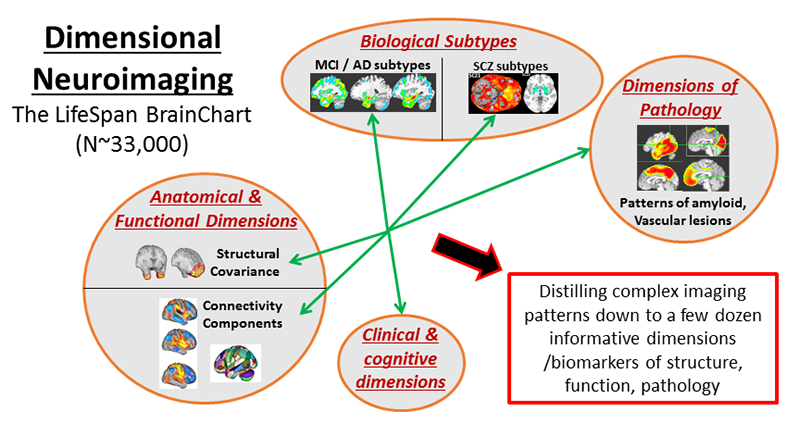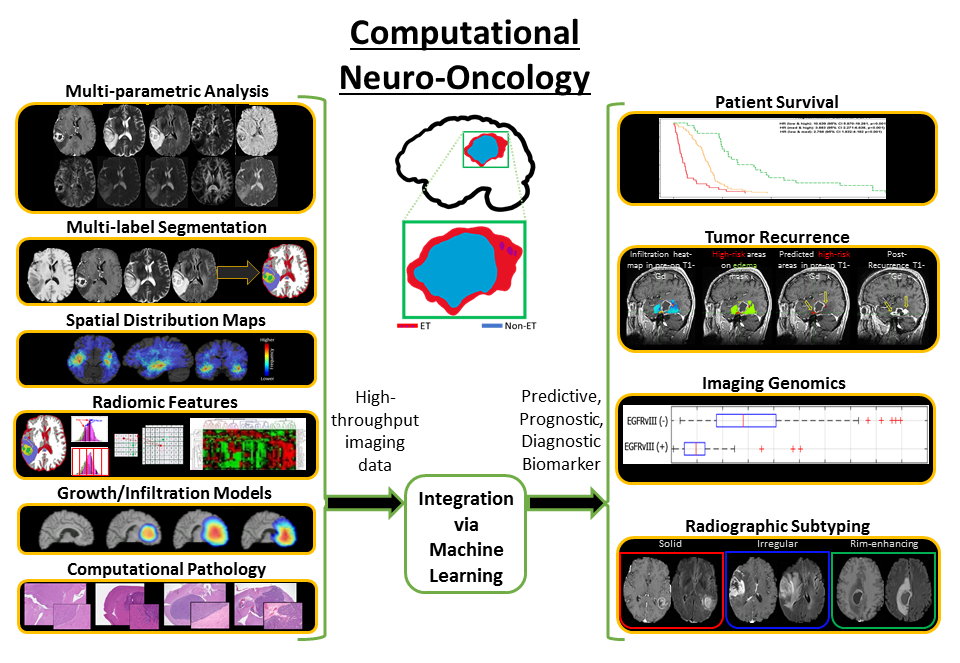
Focus
Constructing imaging signatures for various diseases and disorders serving as personalized biomarkers for precision diagnosis & predictive modeling. The Artificial Intelligence in Biomedical Imaging Laboratory's long standing record on use of machine learning in neuroimaging includes studies of aging, Alzheimer’s Disease, schizophrenia, brain cancer, and functional connectivity. Some of the current challenges and targets include dissecting disease heterogeneity using semi-supervised learning methods, establishing radiogenomic markers of genetic mutations, and relating data from radiology and pathology.

Recent Publications
1. Nasrallah IM, Pajewski NM, Auchus AP, Chelune G, Cheung AK, Cleveland ML, et. al. Association of intensive vs standard blood pressure control with cerebral white matter lesions. JAMA. 2019 Aug 13;322(6):524-534. doi: 10.1001/jama.2019.10551.
2. Davatzikos C. Machine learning in neuroimaging: Progress and challenges. NeuroImage. 2018. DOI: 10.1016/j.neuroimage.2018.10.003.
3. Davatzikos C, Rathore S. et al. Cancer imaging phenomics toolkit: quantitative imaging analytics for precision diagnostics and predictive modeling of clinical outcome. J Med Imaging. 2018.
4. Binder ZA, Thorne AH, Bakas S, et al. Epidermal Growth Factor Receptor Extracellular Domain Mutations in Glioblastoma Present Opportunities for Clinical Imaging and Therapeutic Development. Cancer Cell. 2018.
5. Akbari H, Bakas S, et al. In vivo evaluation of EGFRvIII mutation in primary glioblastoma patients via complex multiparametric MRI signature. Neuro Oncol. 2018.
6. Li H, Satterthwaite TD, Fan Y. Large-scale sparse functional networks from resting state fMRI. NeuroImage. 2017.
7. Sotiras A, Toledo JB, Gur RE, Gur RC, Satterthwaite TD, and Davatzikos C. Patterns of coordinated cortical remodeling during adolescence and their associations with functional specialization and evolutionary expansion. PNAS. 2017.
8. Dong A, Toledo JB, Honnorat N, Doshi J, Varol E, Sotiras A, Wolk D, Trojanowski JQ, Davatzikos C. Alzheimer’s Disease Neuroimaging Initiative, “Heterogeneity of neuroanatomical patterns in prodromal Alzheimer's disease: links to cognition, progression and biomarkers”, Brain, 140(3), 735-747, March 2017.
Contact Us
ABIL at the Center for Biomedical Image Computing & Analytics (CBICA)
3700 Hamilton Walk
Richards Building, 7th Floor
Philadelphia, PA 19104
Phone: 215-746-4060
Learn more about the ABIL